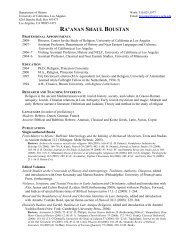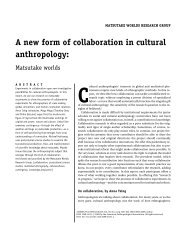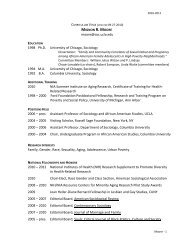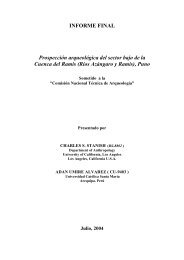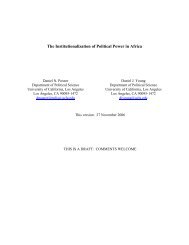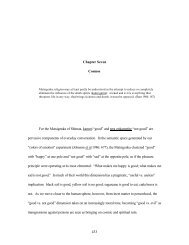The Long-Term Effects of Africa's Slave Trades - Social Sciences ...
The Long-Term Effects of Africa's Slave Trades - Social Sciences ...
The Long-Term Effects of Africa's Slave Trades - Social Sciences ...
You also want an ePaper? Increase the reach of your titles
YUMPU automatically turns print PDFs into web optimized ePapers that Google loves.
<strong>of</strong> slaves, when possible they intervened in the political process to promote<br />
internal conflict and instability (Barry, 1992; Inikori, 2003). <strong>Slave</strong> merchants<br />
and raiders formed strategic alliances with key groups inside villages or states<br />
in order to extract slaves. Typically, the alliances were with the younger men<br />
<strong>of</strong> the community who were frustrated by the control <strong>of</strong> power by the male<br />
elders. <strong>The</strong> consequence <strong>of</strong> this was increased internal conflict and political<br />
instability (Klein, 2003).<br />
In the end, the consequences <strong>of</strong> internal conflict and insecurity were increased<br />
political instability, and in many cases the collapse <strong>of</strong> pre-existing<br />
forms <strong>of</strong> government (Lovejoy, 2000, pp. 68–70). Historians have documented<br />
numerous examples <strong>of</strong> this. In 16th century Northern Senegambia,<br />
the Portuguese slave trade led to the eventual disintegration <strong>of</strong> the Jol<strong>of</strong>f<br />
Confederation, which was replaced by the much smaller kingdoms <strong>of</strong> Waalo,<br />
Kajoor, Baol, Siin and Saalum. Further south, in Southern Senegambia, the<br />
same pattern is observed. Prior to the slave trades, complex state systems<br />
were in the process <strong>of</strong> evolving. However, this evolution stagnated soon after<br />
the arrival <strong>of</strong> the Portuguese in the 15th century (Barry, 1998, pp. 36–59).<br />
<strong>The</strong> most dramatic example <strong>of</strong> the weakening <strong>of</strong> domestic political institutions<br />
is the Kongo Kingdom <strong>of</strong> West Central Africa. As early as 1514, the<br />
kidnapping <strong>of</strong> local Kongo citizens for sale to the Portuguese had become<br />
rampant, threatening social order and the King’s authority. In 1526, Affonso,<br />
King <strong>of</strong> Kongo, wrote to Portugal complaining that “there are many<br />
traders in all corners <strong>of</strong> the country. <strong>The</strong>y bring ruin to the country. Every<br />
day people are enslaved and kidnapped, even nobles, even members <strong>of</strong> the<br />
king’s own family.” (Vansina, 1966, p. 52). This break-down <strong>of</strong> law and<br />
order resulted in the weakening and eventual fall <strong>of</strong> the once powerful state<br />
(Inikori, 2003). For many <strong>of</strong> the other Bantu speaking ethnicities, stable<br />
states also existed in earlier periods, but by the time the slave trades were<br />
brought to an end few ancient states remained (Colson, 1969, pp. 36–37). 7<br />
7 <strong>The</strong> research <strong>of</strong> Tilly (1990) and others argue that the modern system <strong>of</strong> nation states<br />
in Europe was the result <strong>of</strong> constant conflict and competition between states. However, in<br />
Africa the conflict caused by the slave trades did not result in the development <strong>of</strong> strong<br />
states. Instead, the result was an increase in internal conflict, which retarded, rather<br />
than facilitated, state development. <strong>The</strong> reason for the difference is that during the slave<br />
trades, individuals had an option <strong>of</strong> protecting themselves from the external insecurity<br />
by engaging in kidnappings and slave raiding within the community. Here, the individual<br />
could gain at the expense <strong>of</strong> the community. In Europe, members <strong>of</strong> a community did<br />
not have this option and as a result, their interests were aligned with the interests <strong>of</strong> the<br />
community or state as a whole. It was in everyone’s best interest to maintain and promote<br />
strong stable states. Lovejoy (2000, p. 70) addresses this difference between Africa and<br />
Europe, writing that “the record <strong>of</strong> warfare that fills the accounts <strong>of</strong> past [African] states<br />
7






